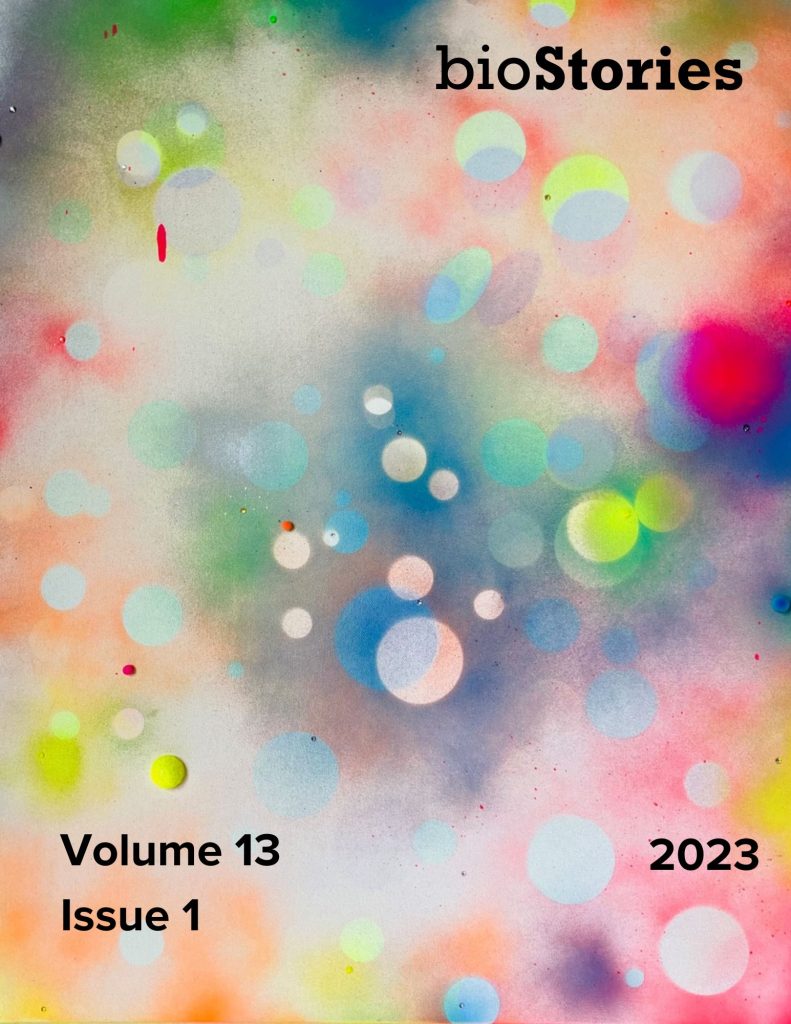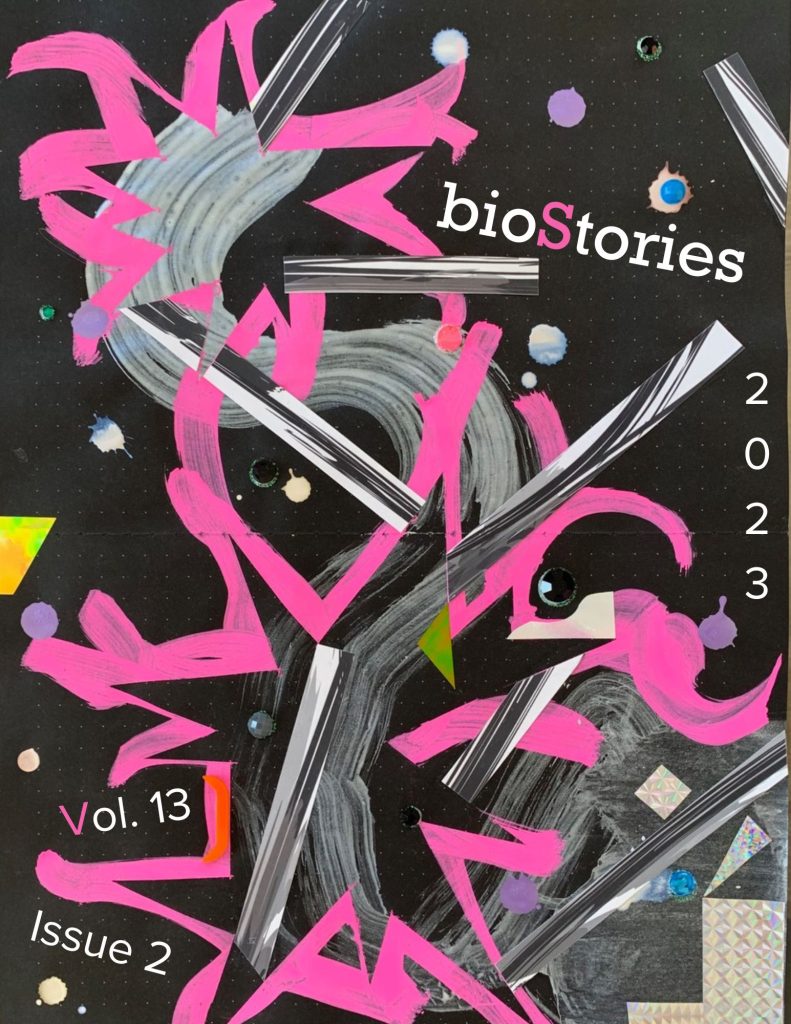Weekly Featured Essay
We feature new essays every Wednesday; make it a weekly habit to stop by and be enchanted by our eclectic content.
This week we feature an essay that depicts a circumstance that probably hits close to home for many–a reflection on being a witness to racism and not standing up sufficiently as an ally to those being victimized.
Wichita 2:28 a.m.
by Mark Lewandowski
While Pamala and I waited for the host, we scanned the restaurant for empty places. Even at this late hour Denny’s was packed, mostly by youngish white couples like us wanting an early breakfast after the bars had closed. But just on the other side of the host station four tables had been pushed together to accommodate a large Black family. There were school-aged kids, and likely parents and grandparents. I assumed the booths behind them seated overflow members of the group, since one of the young girls occasionally looked back and laughed with a boy there. A cousin, perhaps? All were dressed to the nines: the men and boys in suits and ties, the women in full length dresses with the padded shoulders—a popular style in 1988—and the daughters and granddaughters with puffed sleeves on their bright yellow and red and blue dresses, hair pulled back with matching ribbons, legs and feet clad in white socks and blacked, buckled shoes polished to a glimmer. Were they returning from wedding?
Looking at them I felt like a slob: face pasty white from not only two months of reading and writing as a first-year graduate student, but before that three months sliming fish in Alaska. I wore cheap draw string pants from J.C. Penny’s and a thread bare Grateful Dead t-shirt with soggy pits.
MORE ESSAYS
A Good Cup of Chai
by Hailey Duggirala
Making a really good cup of chai takes practice.
Ash perches on the countertop of our house-share kitchen, watching me work. It is one of those rare, quiet moments of life in a college town, when all of our roommates are out and we can play house; pretend that we are five years into some invisible, idealized future, in which my poetry and their novels can pay the bills on our own place. I toast cardamom pods, star anise, and cinnamon on the stove and imagine my father moving around the kitchen.
Time
by David Riessen
Before our beautiful son Sam was born, there was no Sam. That makes sense. Or does it? And after Sam died, we go back to no Sam? Do we? No, definitely not. Time is all messed up, and before and after might not exist beyond our own convoluted, subjective perceptions.
When Sam was about three, he had a science fiction view of how the world works. If something bad happened, he would cry out for us to bend the immutable laws of physics.
“Make it today again! Please, Mommy, make it today again!”
At the River
by Sydney Lea
This strange tale unfolds by moving water in Wyoming. It’s a fisherman’s story, involving an enviable spot to cast a fly, so out of an inveterate angler’s secrecy, I won’t specify the exact location, though I’ll never go back there now.
All you need is a picture in any case. Early September. I could see slate canyons, hawks and eagles soaring all day, more than my liveliest imagination could have conjured, through air so clear that it winked with frost at sunrise. That world, of course, contained more, much more. And yes, the river running by my camp teemed with trout.
Never had I believed so completely in the sufficiency of quotidian things, a sense bound up with what I’ll remember in this account. Let me state something right off that will become more and more obvious. Sometimes I’m a person too bent on finding connections among things I observe, even, or perhaps especially, when most of the observations are inner and visionary, if you’ll forgive that grandiose word. Is this the sort of thing you also do? I mean, do you make up some narrative that threads things together by way of what we glibly call mere imagination? Is your narrative for that reason flatly untrue? I won’t tip my hand on such a matter. Not yet.
Care Less
by Sarah DeParis
The panic rose in my chest. My heart pounded. I felt sweaty, dizzy, and utterly out of control. A palpable cloud of despair made the air feel thick and oppressive. I couldn’t breathe. I was vaguely aware of the chilly northern California February air, the fog that hung low, the faint smell of leather and almost-new-car. I was above myself looking down: a shiny blue sedan parked outside a hospital, a small woman sitting in the driver’s seat, white-knuckled hands clasped on the steering wheel like a life raft, forehead pressed against her hands as if bowed in prayer, shoulders heaving. The words rose as a deafening roar in my head: I can’t do this anymore. I tried desperately to battle the words down, to stuff them back into whatever hole they came from like a towel shoved into a drain. It was a Friday morning, 7 a.m., and I had five surgeries to perform that day.
But the more I pushed the words down, the louder the roar became. Then, the roar became images: terrifying flashes of a gruesome car accident, a bottle of pills, a gun. They were intrusive and foreign and shocking but accompanied by a sense of relief, enticing and sweet.
Desperate to continue to take care of my patients, to not disappoint them, or my boss, or my staff, I steadied myself, shuddered, and began to breathe. I opened the car door and swung my legs out jerkily, like a marionette. I willed myself to stand, willed myself to take one step, then another. I walked from the parking lot to the hospital entrance, vaguely aware of the other human shapes in scrubs filing in the same direction towards the door. A smile pasted itself to my face, my shoulders straightened, a switch flipped: I was a surgeon again.
Max Krasner
Max Krasner
65 Boston Street (home)
540 Market Street (business)
Newark, New Jersey

“Newark’s Milk Station #1 Owner”
“If these stations are the means of saving but a single life during the entire summer, all the labor, time and money they have cost will be repaid a thousand fold.”—Newark Evening Star, August 16, 1915
Objective: To find a wife even Mama approves of.
EDUCATION
Kheder, Borisov, Russia
Apprentice joiner, Borisov, Russia (good at math, I can calculate in my head)
Night school to become a US citizen, Central School, Newark, NJ
Acquired first papers, Newark, NJ
IMMIGRATION
1899 SS Rotterdam from Rotterdam, Holland
Pilgrim
by Phil Cummins
Worryingly high. Not a tad high, or just a teensy bit on the high side. But worryingly high, as if the adjective needed some extra punch. That’s how my healthcare provider described my cholesterol levels during a call to discuss the results of bloodwork. Not surprisingly, my middle-aged heart gave a little wobble as my anxious mind promptly worried up a future filled with cardiovascular concerns. This call was a blunt reminder that ageing inexorably pushes one ever closer to the high mileage category, a time when the body often decides it no longer wishes to cooperate as slavishly as it once did. It loses pace and starts to grumble and creak, periodically sending out urgent reminders of the need for a regular overhaul in order to maintain its roadworthiness. This call was one such reminder, and to maintain drivability I needed to reduce saturated and trans fats in my diet, ramp up my intake of soluble fibre, and take considerably more exercise. In other words, an end to all gustatorial joy and time to get fitted for new trainers. It was goodbye to fried food and takeouts, and hello to fresh fruit and workouts. Driving home, I began to imagine my stomach straining against the seatbelt, reinforcing the need for action.
One week later, my wife and I booked ourselves in for a pilgrimage along the Camino de Santiago in Northern Spain.
These two events, it should be said, are only partly connected.
Walks with Caribou
by Michael Engelhard
It is my last day guiding a weeklong backpacking trip in mid-July from the East Fork of the Chandalar to the headwaters of the Hulahula. We are camped on the western bank of the Hulahula in the broad, treeless valley an Ice-Age-glacier incised. Because the morning is drizzly, my peeps still hide inside their sleeping bags. Over a contemplative cup of Joe in the kitchen area—a stone’s throw away from our tents—I notice shifts in what in the flat light resembles a boulder field.
“You might want to come outside. The whole hillside is crawling with caribou,” I rouse the sleepyheads, unaware yet that I’m seeing a vanguard of ten thousand, a quarter mile down the valley, a prong of the Porcupine herd’s southbound trans-border migration. I feel we have suddenly struck it rich.
Quantum Physics
by Beth Benedix
The black and white tabby loped gingerly across the gravel towards the base of the grain bin. From a birds-eye view, the bin is one of a handful dotting the sparse expanse of pastures and cornfields situated forty-three miles from the nearest city (Indianapolis), twelve from the nearest supermarket (Kroger). A glacier-cut landscape that turns instantly from barren to lush in the curve of a road or the transition from winter to spring, most of the houses sit next to barns, acres sprawling between cultivated plots of land, some with rusted cars or trailers tucked behind wire fences, chickens darting in and out of man-made boundaries that mean nothing to them.
“Don’t let him get under there, Abby,” Anthony said, squinting into the late November afternoon sun.
Anthony’s voice registered an anxious click, not-yet panic. His wife, Abby, lunged in slow motion, her right arm scooping dust as the cat disappeared into the opening, disproportionately agile in his weakened state. In her left hand, she held the phone to her ear as she described the play-by-play to the vet while Anthony ran inside the bin. Circumnavigating the elevated floor, he surveyed the slatted metal for vulnerable cracks to access the crawlspace beneath it.
“He’s hurt,” Abby snapped into the phone. “We think he was hit by a car. His jaw looks misaligned and there’s blood all over him. Shit! He just climbed under the bin. We can’t see him!”
Abby jammed the phone in her pocket, sliding onto her belly in front of the narrow opening. Her head ducking a strand of web, she peered as far into the dark as the cinder block framing the opening would allow.
“I can’t see him,” she told Anthony.

